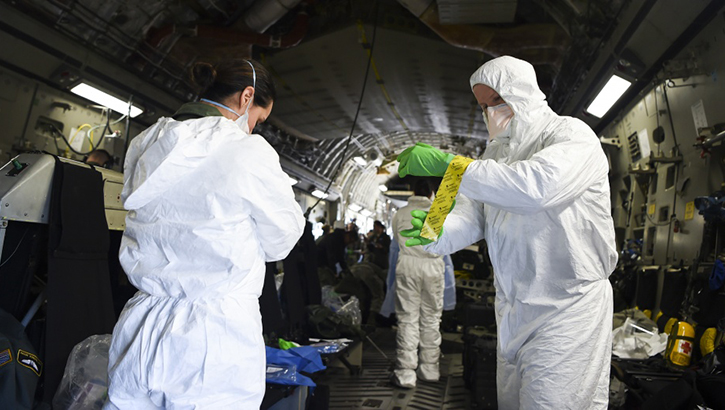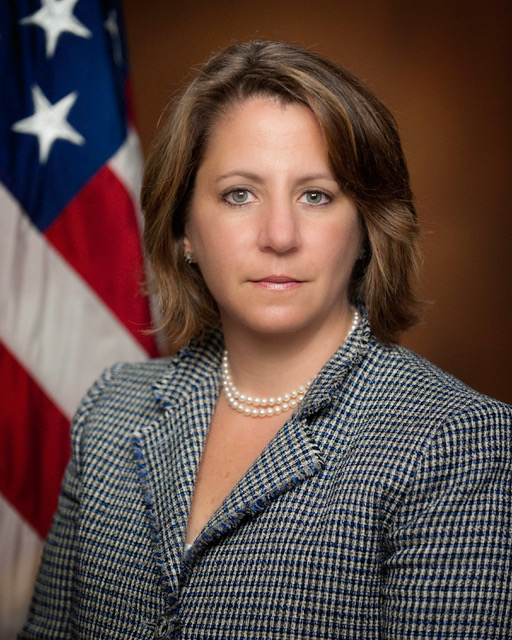The Coronavirus Shows Why the U.S. Must Make Pandemic Disease a National Security Priority
In responding to the coronavirus, the U.S. should apply lessons learned from past transnational threats—but unfortunately, in important respects, the federal government is moving in the wrong direction.

Published by The Lawfare Institute
in Cooperation With

In 2018, I published an article with public health expert Vin Gupta sounding the alarm about the failure to prepare adequately for emerging infectious diseases. We were hardly the only ones. Our article, “The Next Pandemic Will Be Arriving Shortly,” joined many national security and public health experts in using the 100th anniversary of the 1918 Spanish flu pandemic, which killed 50 million people, to focus attention on the national security imperative that is pandemic disease. From my perspective as the former homeland security and counterterrorism adviser to President Obama, the role through which I helped lead the successful response to Ebola in 2014, I believed it was necessary to highlight the need to treat pandemic disease with the same urgency that the United States applies to other transnational threats.
Normally, op-ed authors can disavow as sensational and inaccurate the titles given to their articles by headline writers. That turned out not to be the case for us. Although not yet a pandemic, a year and a half after we first wrote, the novel coronavirus (known as 2019-nCoV) is now surging out of China. Originating in the city of Wuhan, China’s seventh-largest city with a population of 11 million, the virus—likely transferred from an infected bat—has now caused more than 31,000 people to become sick and 638 deaths, as of Feb. 7. It has also spread to two dozen countries, with 11 cases in the United States. Diseases don’t respect borders, and one of the country’s foremost experts has said the coronavirus will almost certainly become a pandemic.
Pandemic disease poses one of the greatest threats to global stability and security. In responding to the coronavirus, the U.S. should apply lessons learned from past transnational threats—but, unfortunately, in important respects, the federal government is moving in the wrong direction. That’s bad for the response to the coronavirus today and even worse for the nation’s readiness for the global health security threats that are coming.
The picture is not entirely dire. Congress should be commended for creating a Public Health Emergency Fund, and we are fortunate that able and seasoned career leaders like Tony Fauci at the National Institutes of Health (NIH) and Anne Schuchat at the Centers for Disease Control and Prevention (CDC) are guiding the government’s efforts. U.S. officials have offered repeatedly (albeit unsuccessfully) to deploy CDC experts to assist in China. There are also signs that some lessons from the effort to combat Ebola in 2014 are being put to use, like the new screening and monitoring protocols developed for and implemented to deal with Ebola. But with the number of cases soaring daily, and in the absence of accurate estimates of the virus’s lethality, there is much more the U.S. should be doing to address the coronavirus. Ron Klain, the 2014 Ebola response coordinator, provided a comprehensive outline for this in his testimony earlier this week before the House Committee on Foreign Affairs.
The good news thus far is that the coronavirus appears to be less lethal than its viral cousin SARS was in 2002 and far less lethal than Ebola was in 2014. The bad news is that today’s virus, as a respiratory illness transmissible through coughing and sneezing, is more easily transmissible than Ebola. And because it may also be transmissible during the incubation period when no symptoms are apparent, the control measures pioneered for Ebola in 2014—funneling travelers to particular airports and then conducting temperature checks for signs of fever and other indicia of infection—may not be as effective.
Scientists have long known the danger of pathogens moving from animals to humans. In today’s highly mobile society, transmission of emerging infectious diseases like the coronavirus or H7N9 (a persistent strain of avian flu) is just a flight away. In an effort to respond to this danger, the U.S. and nations around the world launched the Global Health Security Agenda in 2014 to build global capacity to fight diseases like the coronavirus. But these investments have been reduced in the past several years. Congress has not yet renewed funding for the network of “Ebola and Special Pathogen Hospitals” created after the Ebola epidemic in 2014, even though the lack of such an advanced capability in 2014 put first responders and health workers at risk. And the Trump administration has slashed critical funding for prevention efforts at CDC for three years in a row.
If the U.S. is to treat pandemic disease as the national security priority it should be, the government must improve in three areas: White House leadership and organization, U.S. leadership in addressing pandemics on the global stage, and making sure policy is guided by facts, not alarmism.
Crisis breeds confusion and confusion sucks up valuable time—time that must be spent getting facts, summoning resources and executing a plan. None of that is possible without leadership and organization. The U.S. government learned some important lessons from crises as different as 9/11 and Ebola, identifying gaps and putting in place people and structures to be better prepared and more effective in responding to the next crisis. For instance, after 9/11, President George W. Bush created the position of homeland security adviser in the White House. The idea was to have one person in the White House who is directly and immediately accountable to the president, focused 24 hours a day on complex transnational threats—terrorism, cyber, pandemics—and to coordinate our country’s policies and activities across government. President Obama saw the wisdom of this role and kept it. Inexplicably, today that job has been erased—but the world has not gotten any simpler, nor the threats any less complex. The loss of this role will likely hinder the government’s coronavirus response today.
More concerning is the dismantling of the dedicated unit within the National Security Council (NSC) that was set up as a result of our experience in responding to Ebola. In 2014, to address the epidemic at its source in West Africa and prepare for and respond to cases in the United States, a massive whole-of-government effort was required along with a dedicated coordinator in the White House. President Obama wisely appointed Ron Klain to serve as the Ebola response coordinator. Although the problem called for a dedicated response, as Klain has said, there should never be a need for another disease-specific “czar” because the government should have the right structure in place before it’s required. And that’s precisely what he recommended to the president. As a result, the administration set up the Pandemic Preparedness and Response Directorate within the NSC, a dedicated unit to oversee preparedness for pandemics.
But in 2018, that unit was dismantled and its career expert leader reassigned. Today, there is no dedicated unit within the NSC to oversee preparedness for pandemics or the current response to the coronavirus. That makes no sense. The government has dedicated teams for terrorism, for cyber threats—why not for the threat that, as Bill Gates and others have identified, is likely to kill the most people in the shortest amount of time over the next several years?
Without the personnel and structures in place to prepare for, plan and respond to emerging infectious disease threats, the U.S. will always be on its back foot. The White House has announced a Coronovirus Task Force led by Secretary of Health and Human Services Alex Azar. This is all well and good—but when it comes to resolving the inevitable disputes between agencies and dedicating the necessary time to as wide ranging and complex a challenge as coronavirus, a single cabinet secretary simply can’t do it all and run an agency at the same time. And some decisions can be made only by the White House. The government should be learning from the past and building on thoughtful recommendations like those from the Bipartisan Commission on Biodefense, whose Blueprint for Biodefense has called for elevated White House focus. Instead, in the midst of the current crises, the government is unwisely reinventing the wheel.
Another lesson we learned from the Ebola response is that the key to an effective response is—to borrow a phrase from the cyber realm—to “defend forward.” Global health security means global leadership, and it requires the U.S. to be the quarterback. Ebola resulted in 11,000 tragic deaths, but the death toll would have been far worse without the United States working at the presidential level to mobilize resources from allies like the U.K. and France, and the deployment of U.S. troops to help combat the epidemic. Without a global response, organized by the U.S. and implemented by Africans and brave public health workers, Ebola would not have been contained in West Africa.
The United States cannot afford to be isolated, to retreat behind walls. It must be willing to dedicate resources to defend forward. In a world of emerging infectious diseases, it is far more effective and frankly less costly to build capacity abroad to identify emerging infectious diseases early and stop them before they reach U.S. shores. This was the idea behind the Global Health Security Agenda launched in 2014. The Trump administration has said it is committed to this multilateral initiative—but there is an opportunity to bolster that statement and actually make it a priority among the G-7 nations at the upcoming Camp David summit.
Finally, the government must lead with the facts and with science, first, last and always. Officials should be humble about what they know and don’t know about the novel coronavirus. It is still early, and the lack of full transparency from Chinese authorities and the failure of China to accept the U.S. offer to help on the ground means the picture is murkier than it should be. But as the picture fills out, the government should be making sure that facts and science are driving decision-making, not hysteria and politics.
I was there when President Obama repeatedly pressed for information rooted in science, not polls, to inform his decision-making on Ebola. He relied on subject matter experts and demonstrated—through his hug of Ebola patient Nina Pham—that compassion and facts can be more persuasive than paranoia. Today, there are dangerous signs that racism and xenophobia, not to mention harmful misinformation, are spreading along with the virus. As the U.S. wrestles with how to understand what is happening with the coronavirus, the government should make sure that facts, not fear, govern its actions.
Many reforms have been implemented by leaders who heeded the saying “never let a crisis go to waste.” Right now, the government is wasting the benefits of the crises that have gone before. That is not only a shame—it’s dangerous. Because the next pandemic will be arriving shortly.



.jpg?sfvrsn=8588c21_5)
-final.png?sfvrsn=b70826ae_3)
